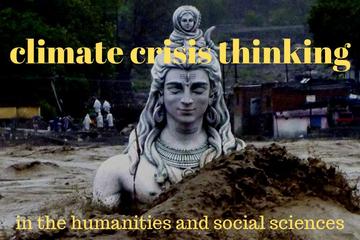Climate Crisis Thinking in the Humanities and Social Sciences

The intensifying global climate crisis calls for a radical re-evaluation of academic methodologies, conceptions and agendas. So far, the sciences have led the way in understanding and publicising the growing crisis, but have not succeeded in bringing about the necessary urgent and wide-ranging societal transformation that we need. For this work, it is essential that the expertise, knowledge, imagination and values of Humanities and Social Sciences are made central to public and policy conversations around how to respond and adapt to the climate emergency. In the case of many disciplines, this requires a rethinking of fundamental aspects of our fields, our teaching, and our forms of public engagement.
Our network, involving participants from many of Oxford’s Humanities and Social Sciences Faculties, working together with climate scientists and a number of external participants, will provide a high-profile forum for interdisciplinary collaboration of a novel form. It has two fundamental and related aims. One is to develop, explore and disseminate a much broader basis for thinking about transformative responses to climate change and related threats. The other is to use the current situation as a provocation to the ways in which humanities and social sciences work together and produce knowledge. Our objective is to deploy the climate crisis as an impetus for a radically transformative intellectual collaboration that can simultaneously be public facing even as it attempts to carve out new ways of making academic knowledge. Simultaneous to this process of rethinking disciplinarity and scholarship through a centring of climate crisis is the development of new pedagogical forms through which we can teach the generations who are facing the complex challenges of an increasingly unstable future.
The network aims to explore the following themes:
Understanding and undoing teleologies. How can we rework notions of modernity as progress and reject discourses around triumph over nature?
Lessons from the past. What can we learn from past climate and environmental changes?
Decentring and decolonising climate crisis. What happens when the climate crisis is seen through women’s history and cultural practices, indigenous histories or ethnographies and archaeologies of the nonhuman?
A new concept of society. How can we develop new models and histories of human societies that can describe them as situated within complex planetary ecosystems?
A new ethics. How can the essential values of empathy, imagination, kindness and love towards others be brought into climate change discussions, as fundamental to how present actions and the human future are envisioned?
A new politics and economics. How can we think historically and laterally about the politics of the environment and the prevailing focus on tensions between economic growth and climate change mitigation? What does a politics and economics that takes climate change seriously look like? Which political and economic ‘constraints’ are real and which illusory?
Beginning in October 2019, we are holding a series of open workshop meetings to which all interested researchers and students are invited. We welcome enquiries from anyone interested in joining the core group of researchers, particularly including people from Faculties not currently represented. We would also welcome involvement from external organisations.
The workshops will use a series of themes to explore where each discipline has got to in responding directly to climate and environmental issues, and how far it has begun to adjust its central objectives, concerns, methodologies, language, research and teaching to the prospect of needing to address a different future and different societal needs and questions. We will then build collaborative thinking around the elements each participant identifies as helpful for the needs of their own discipline. Ultimately, we aim to develop a pool of shared approaches, strategies and knowledge. During the second stage of the network, we will use these to develop two projects and make them available on our website: A Collaborative Syllabus for Climate Crisis and A Toolkit for Societal Transformation.
Contact: Amanda Power amanda.power@stcatz.ox.ac.uk, Nayanika Mathur nayanika.mathur@area.ox.ac.uk
Please email Amanda to join the Climate Crisis Mailing List.


